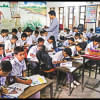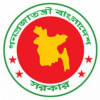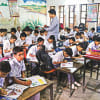Don’t neglect primary education

A recent government report has revealed a concerning statistic: the number of students in all primary-level educational institutions in the country has reduced by over 8.32 lakh in 2023 from the previous year. The implications of this decline is no doubt significant, as primary education is the foundation for bringing up a skilled, informed generation to ensure Bangladesh's prosperity. While officials have highlighted the country's declining birth rate and a new, more accurate software at the Directorate of Primary Education for this decrease, there are other pieces of the puzzle which, if not resolved, can have grave repercussions for the country's future.
The Covid pandemic dealt a major blow to education, as financial struggles brought on by it forced many to take their children out of primary school or transfer them to Qawmi madrasas. Infact, financial insecurity continues to be one of the biggest detriments to primary education. According to UNESCO, households account for 71 percent of total education spending in Bangladesh, one of the highest in the world. The average annual family cost per child in 2023 was Tk 17,294 for primary education, stated the Education Watch 2023 report. To put things in perspective, the average monthly family income in 2022 was just Tk 32,422. News of parents taking their daughters out of school and marrying them off circulated all around during the pandemic, and unfortunately the trend has continued since then.
Meanwhile, many of the government-run primary schools are in no shape to cater to the children, reeling from the absence of a proper learning environment, lack of safety, and poor infrastructure. Only those from the low-income group see these institutions as an option—and even they prefer madrasas in many cases.
In this scenario, this year's budget for education is Tk 94,710 crore—only 1.69 percent of the GDP, the lowest in the last 16 years. The drop in the number of students, revealed by the Annual Primary School Census 2023, might very well be due to a falling birth rate and improved software, but we cannot ignore the contributing factors that have been plaguing the sector for years. When more than 60 percent of Class 3 students and 70 percent of Class 5 students do not have the expected grade-level proficiency in mathematics (according to an assessment), it is clear that our primary education is faltering. The government must address these cracks to ensure that all children in the country get access to the best primary education possible.


 For all latest news, follow The Daily Star's Google News channel.
For all latest news, follow The Daily Star's Google News channel. 









Comments